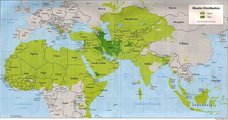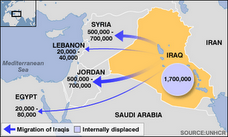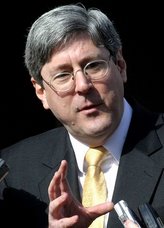
NEW YORK TIMES:
IN BAGHDAD SECTARIAN LINES TOO DEADLY TO CROSS
BAGHDAD, March 3 — After centuries full of vibrant interaction, of marrying, sharing and selling across sects and classes, Baghdad has become a capital of corrosive and violent borderlines. Streets never crossed. Conversations never started. Doors never entered.
Sunnis and Shiites in many professions now interact almost exclusively with colleagues of the same sect. Sunnis say they are afraid to visit hospitals because Shiites loyal to the cleric Moktada al-Sadr run the Health Ministry, while Shiite laborers who used to climb into the back of pickup trucks for work across the Tigris River in Sunni western Baghdad now take jobs only near home.
Sybaa Street used to be wall-to-wall people: sidewalks were crammed with shoppers, and roads were snarled with cars. In the heart of central Baghdad, Sybaa was known as the road to get from the automotive shops on one side of the market district to the hardware stores on the other. Back then — as recently as two years ago, residents said — no one seemed to care that it was the border between the mostly Sunni neighborhood of Fadhil and the largely Shiite areas to the south, Sadriya and Sheik Omar.
But that has all changed. After six months of fighting between Sunnis and Shiites, Sybaa Street is now deserted and forsaken. On a recent afternoon, the only sign of life was a lone mechanic working inside a dark garage, his efforts lighted by a single bulb. Bullets from earlier battles punctured nearly everything — buildings, utility poles, even rusted mufflers hanging outside shuttered shops.
Um Shaima, 48, a garrulous Sunni widow who used to sell yogurt in the Sadriya market, lives just north of Sybaa Street in Fadhil. She said she used to visit the stores there for clothes. Her cousin Samir worked for years on the Sadriya side of Sybaa Street as a mechanic without any trouble.
Then a few months ago, Ms. Shaima said, he received a threat. “They told him, ‘You are a Sunni, and all Sunnis are infidels and their women are prostitutes, so stop coming to Sadriya or you will be killed,’ ” she said.
“He didn’t listen,” she added. The next day, he was kidnapped. Witnesses said Shiite militants yanked him off his motorcycle and threw him in the trunk of a sedan. “They called his wife at 9 a.m. the next day,” Ms. Shaima said, “telling her that they will kill all the Sunnis, and your husband is dead.”
“He didn’t listen,” she added. The next day, he was kidnapped. Witnesses said Shiite militants yanked him off his motorcycle and threw him in the trunk of a sedan. “They called his wife at 9 a.m. the next day,” Ms. Shaima said, “telling her that they will kill all the Sunnis, and your husband is dead.”
Insurgents strike as Iraq vows to avenge slain cops and March 10 conference is planned published: Saturday March 3, 2007:
http://rawstory.com/news/afp/Insurgents_strike_as_Iraq_vows_to_a_03032007.html
A suicide car bomber killed 12 people in an attack on a checkpoint in western Iraq on Saturday, as the embattled government vowed to avenge the murder of 14 kidnapped policemen. South of Baghdad, suspected members of another Sunni faction shot dead six men who dared to attend local reconciliation talks between Sunnis and Shiites.
Shortly afterwards, a coalition of insurgent groups led by Al-Qaeda said in an Internet message that the hostages would be killed to avenge the alleged rape of a Baghdad Sunni woman by Shiite police. Late on Friday, a second message said the killings had been carried out and promised that a video of the murders would be released.
A suicide car bomber killed 12 people in an attack on a checkpoint in western Iraq on Saturday, as the embattled government vowed to avenge the murder of 14 kidnapped policemen. South of Baghdad, suspected members of another Sunni faction shot dead six men who dared to attend local reconciliation talks between Sunnis and Shiites.
Shortly afterwards, a coalition of insurgent groups led by Al-Qaeda said in an Internet message that the hostages would be killed to avenge the alleged rape of a Baghdad Sunni woman by Shiite police. Late on Friday, a second message said the killings had been carried out and promised that a video of the murders would be released.
In the village of Al-Mshahda, just south of Baghdad, a defence official said suspected members of the Islamic Army of Iraq, a Sunni group linked to members of Saddam Hussein's former regime murdered six men who in January had braved death threats to attend peace talks between local Shiite and Sunni factions.
Lieutenant General Thamer Sultan, a Sunni who serves as an adviser Defence Minister Abdel Qader Jassim Mohammed, was snatched in the Jamiaa district of western Baghdad, a defence official said.
US and Iraqi officials confirmed that this week Iraqi and American troops will build their first permanent base in the Baghdad Shiite militia bastion of Sadr City, a joint security station at the edge of the slum district. It was a similar story in Ramadi, which Al-Qaeda has declared to be the capital of an "Islamic Emirate of Iraq," where residents reported that US forces had sealed all entrances to the city.
"The Americans have recently contacted Iran through different channels requesting talks about Iraqi issues and in particular that country's security. We are studying these proposals," he said on state television. There was no initial confirmation of this from Washington, but the White House has previously said it will send envoys to a March 10 conference of Iraq and its neighbours, including Iran, and has not ruled out contacts. The move is seen as a potential policy shift for the United States, which also accuses Iran of seeking to develop nuclear weapons and of supporting terrorists and illegal militias in Iraq, Lebanon and elsewhere.
U.S. forces enter Sadr City
Associated Press, http://www.startribune.com/722/story/1032838.html
Last update: Sunday, March 04, 2007 – 7:33 AM
BAGHDAD, Iraq — Hundreds of U.S. soldiers entered the Shiite stronghold of Sadr City on Sunday in the first major push into the area since an American-led security sweep began last month around Baghdad. Soldiers conducted house-to-house searches, but met no resistance in a district firmly in the hands of the Mahdi Army militia led by radical cleric Muqtada al-Sadr, said Lt. Col. David Oclander.
A spokesman for Sadr's bloc in parliament, Falah Hassan, said there was "no reason" for such a "provocative act." "We told (Prime Minister Nouri) al-Maliki that if there is an arrest operation against anyone, it should be done by Iraqi forces," Hassan said. "We understood that Iraqi forces only would conduct the search and if they faced resistance, then U.S. forces could intervene," he said. "But that was not the case with today's operation." Sadr City presents one of the most difficult steps in the security sweeps that began Feb. 14.
Also Sunday, a kidnapped Iraqi defense official was freed after Iraqi security forces stormed a house where he had been held, a government spokesman said. Brig. Gen. Qassim al-Mousawi said Iraqi agents were acting on a tip when they raided a house in western Baghdad near where Lt. Gen. Thamir Sultan, a Defense Ministry adviser, was abducted a day earlier. He was freed, and all four of his captors were arrested, al-Mousawi said.
Lieutenant General Thamer Sultan, a Sunni who serves as an adviser Defence Minister Abdel Qader Jassim Mohammed, was snatched in the Jamiaa district of western Baghdad, a defence official said.
US and Iraqi officials confirmed that this week Iraqi and American troops will build their first permanent base in the Baghdad Shiite militia bastion of Sadr City, a joint security station at the edge of the slum district. It was a similar story in Ramadi, which Al-Qaeda has declared to be the capital of an "Islamic Emirate of Iraq," where residents reported that US forces had sealed all entrances to the city.
"The Americans have recently contacted Iran through different channels requesting talks about Iraqi issues and in particular that country's security. We are studying these proposals," he said on state television. There was no initial confirmation of this from Washington, but the White House has previously said it will send envoys to a March 10 conference of Iraq and its neighbours, including Iran, and has not ruled out contacts. The move is seen as a potential policy shift for the United States, which also accuses Iran of seeking to develop nuclear weapons and of supporting terrorists and illegal militias in Iraq, Lebanon and elsewhere.
U.S. forces enter Sadr City
Associated Press, http://www.startribune.com/722/story/1032838.html
Last update: Sunday, March 04, 2007 – 7:33 AM
BAGHDAD, Iraq — Hundreds of U.S. soldiers entered the Shiite stronghold of Sadr City on Sunday in the first major push into the area since an American-led security sweep began last month around Baghdad. Soldiers conducted house-to-house searches, but met no resistance in a district firmly in the hands of the Mahdi Army militia led by radical cleric Muqtada al-Sadr, said Lt. Col. David Oclander.
A spokesman for Sadr's bloc in parliament, Falah Hassan, said there was "no reason" for such a "provocative act." "We told (Prime Minister Nouri) al-Maliki that if there is an arrest operation against anyone, it should be done by Iraqi forces," Hassan said. "We understood that Iraqi forces only would conduct the search and if they faced resistance, then U.S. forces could intervene," he said. "But that was not the case with today's operation." Sadr City presents one of the most difficult steps in the security sweeps that began Feb. 14.
Also Sunday, a kidnapped Iraqi defense official was freed after Iraqi security forces stormed a house where he had been held, a government spokesman said. Brig. Gen. Qassim al-Mousawi said Iraqi agents were acting on a tip when they raided a house in western Baghdad near where Lt. Gen. Thamir Sultan, a Defense Ministry adviser, was abducted a day earlier. He was freed, and all four of his captors were arrested, al-Mousawi said.





No comments:
Post a Comment